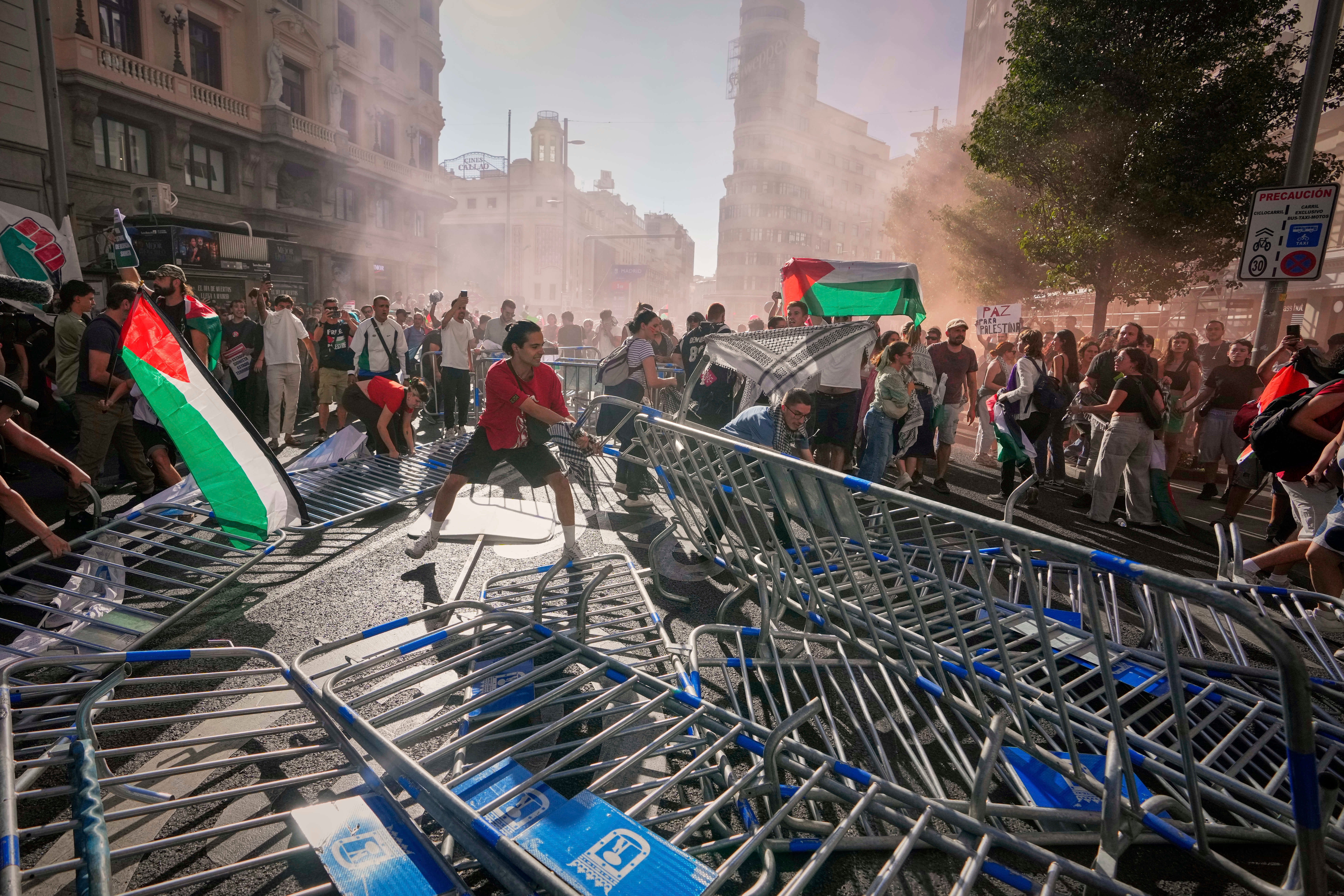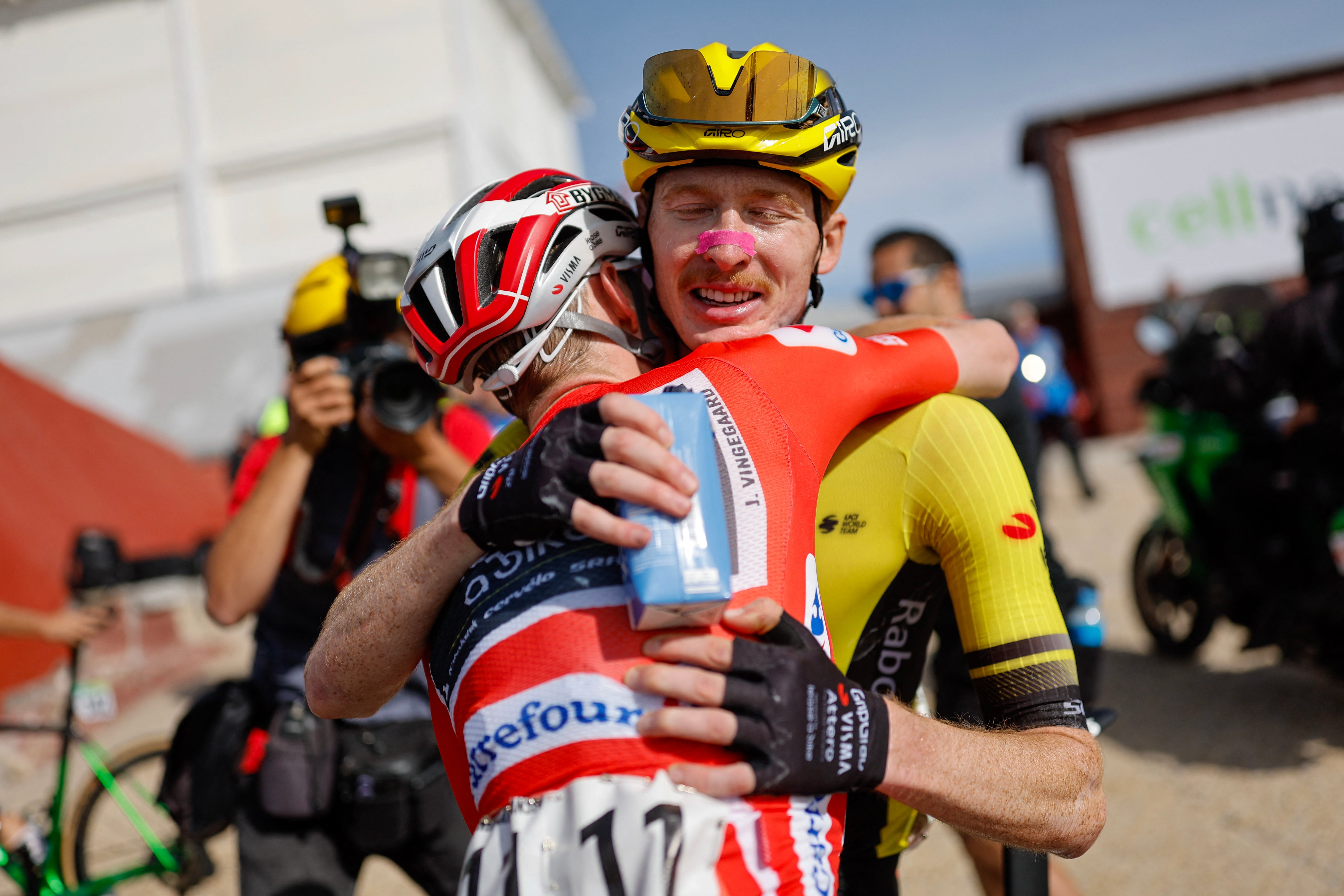Fully kitted out in red, with a shiny red bike to match, Jonas Vingegaard is a grand tour champion once again. The Dane shared a hug with second-placed Joao Almeida as they set off for Sunday’s processional stage 21 – no hard feelings between two particularly gentlemanly competitors – and rode towards Madrid with the feeling of a job well done. The Vuelta is his. A third grand tour to go with his two Tours de France, although those feel like trophies from a different time.
Geopolitics got in the way in Spain. Vingegaard was denied his triumphant arrival into Madrid by massive pro-Palestine demonstrations which have repeatedly dogged this race, forcing the neutralisation and shortening of stages, bringing down two riders in crashes and sending one home injured, and now finally cutting short the Vuelta entirely.
Merits and demerits of the protests aside, they have largely succeeded in ensuring that the actual sporting story of the race has been relegated to a mere sub-plot. That does Vingegaard, the entire peloton, and a hard-fought battle for the red jersey a huge disservice.

Because the sporting story has been well worth that attention.
This race underlined cycling’s natural hierarchy: Vingegaard, and the absent Tadej Pogacar, are the best two grand tour riders in the world. No-one else comes close. Vingegaard finished 1’16” clear of Pogacar’s teammate Joao Almeida, with three stage wins to his name – the last an emphatic Vuelta-clincher on Saturday – and all this achieved despite varying degrees of illness over the course of three weeks. Vingegaard was widely expected to obliterate the competition in Spain; the final result was significantly closer, but still not really in doubt.
In truth, this was a race Vingegaard won in his own particular style. Hammering his rivals is not really the Dane’s vibe; instead he races efficiently, smoothly, targeting stage wins at crucial moments, but not wasting energy otherwise. He looked somewhat flat at this summer’s Tour de France, picking up zero stage wins and failing to make a dent in Pogacar’s armour. But on Spanish terrain the pep was back in his step (or pedal, rather).
His long-range attack to win stage nine raised eyebrows for its audacity; it turned out he had, in a rare moment of misjudgement, not realised how much longer they actually had to race. Stage 20 by contrast was simple, brutal, effective, living with Almeida’s constant pressure until a little over a kilometre to go, then quietly motoring up the road away from him. Job done.
Job done too for Britain’s Tom Pidcock, who demonstrated that his talent – spanning one-day races, cyclo-cross, and mountain biking – knows no bounds when it comes to grand tour racing either. Third place on the podium was secured by a gritty ride to stave off former Giro d’Italia winner Jai Hindley, breathing down his neck on the hideously difficult stage 20, and he finished 30 seconds clear of the Australian for a career-best result. Pidcock has been open about having a new “lease of life” since trading Ineos Grenadiers for lower-level team Q36.5, and this result once again vindicated that decision.
For Vingegaard, it was a clinical win, perhaps low on excitement, but no less significant for that. This has been a barren couple of years for the Dane, by his own high standards. As he reminded broadcasters at the start of stage 21, what should have been his victory lap into Madrid, this is his first grand tour victory in two years.
Perhaps he should already have a Vuelta title from 2023, but team orders were followed and his domestique Sepp Kuss took home the maillot rojo instead. Then in April 2024 came a horrific crash in the Basque Country, where he punctured a lung among numerous other severe injuries.
That derailed his bid to defend his Tour de France title, and while a sub-par Vingegaard is still easily clear of nearly everyone else, it meant he was no match for Pogacar. This year he had no such issues in the build-up to the Tour but was a bridesmaid again, the wallflower to Pogacar’s scene-stealer. So this Vuelta victory was some time in the making, and no doubt all the sweeter for it.

He has rarely looked troubled. Perhaps it would have been a closer-run thing if stage 18’s time trial had not been shortened by the protests that have hamstrung the entire race. But ‘what ifs’ will not keep Vingegaard up at night.
As for Almeida, the Portuguese has proven himself for the first time at grand tour level, even if some question marks remain over his durability. Standing on the podium is a fine achievement. But he surely will have regrets over this Vuelta, even if he is too polite to voice them. It has felt like UAE Team Emirates-XRG, Almeida aside, haven’t actually wanted to win the Vuelta at all.
Winning six individual stages, the king of the mountains classification, and the overall race is fine if you’re Pogacar. Rather less straightforward if competing riders within the same team are all targeting those different goals. Almeida has had to fight a GC battle with most of his strongest lieutenants effectively putting their hands in their pockets, whistling, and pretending not to notice. In the long term it’s hardly a winning recipe for team unity. In the short term, it’s a great way to lose a grand tour.

Besides the obvious emphasis put on stage wins at the expense of the overall, there have been other oddities to UAE’s approach. On stage 19 UAE were completely caught napping as Vingegaard accelerated at the intermediate sprint to pick up another four seconds.
At most grand tours rivals are glued to each other’s wheels, anticipating any and every move. Vingegaard, one of the canniest operators in cycling, is particularly adept at making sure he’s always in the right place at the right time. Why Almeida and his support train didn’t cling to him and neutralise that move simply boggles the mind.
But it felt symptomatic of their entire approach to this race: haphazard, inconsistent, and always a step or two behind. And hardly indicative of conviction in Almeida, despite his obvious ability.

Vingegaard’s winning margin was 1’16” in the end. Almeida was beaten fair and square – but if he had stuck with him, or dropped him on the Bola del Mundo on stage 20, or lost the Vuelta by only that handful of seconds, the inquest into UAE’s tactics would be unforgiving. Of course it isn’t a failure of a grand tour, with their seven total stage wins (including the team time trial) and Jay Vine’s mountains classification win.
But the cracks in the juggernaut are there. And disunity within the sport’s biggest behemoth sets up a fascinating battle for grand tour supremacy in 2026 – as well as indicating something of a succession crisis post-Pogacar.
In the other half of cycling’s greatest duopoly, Visma-Lease a Bike have answered any such questions on their own hierarchy. The future is still Vingegaard, and Vingegaard – redemption tour complete – is here to stay.
More pro-Palestine protests cause cancellation of Vuelta a Espana finale as Vingegaard wins
Jonas Vingegaard on brink of Vuelta triumph as Tom Pidcock holds on to podium place
How the Vuelta a Espana transformed Tom Pidcock into a grand tour contender
More pro-Palestine protests cause cancellation of Vuelta finale as Vingegaard wins
Jonas Vingegaard on brink of Vuelta triumph as Tom Pidcock holds on to podium place
Jasper Philipsen wins stage 19 of Vuelta a Espana ahead of final weekend showdown







